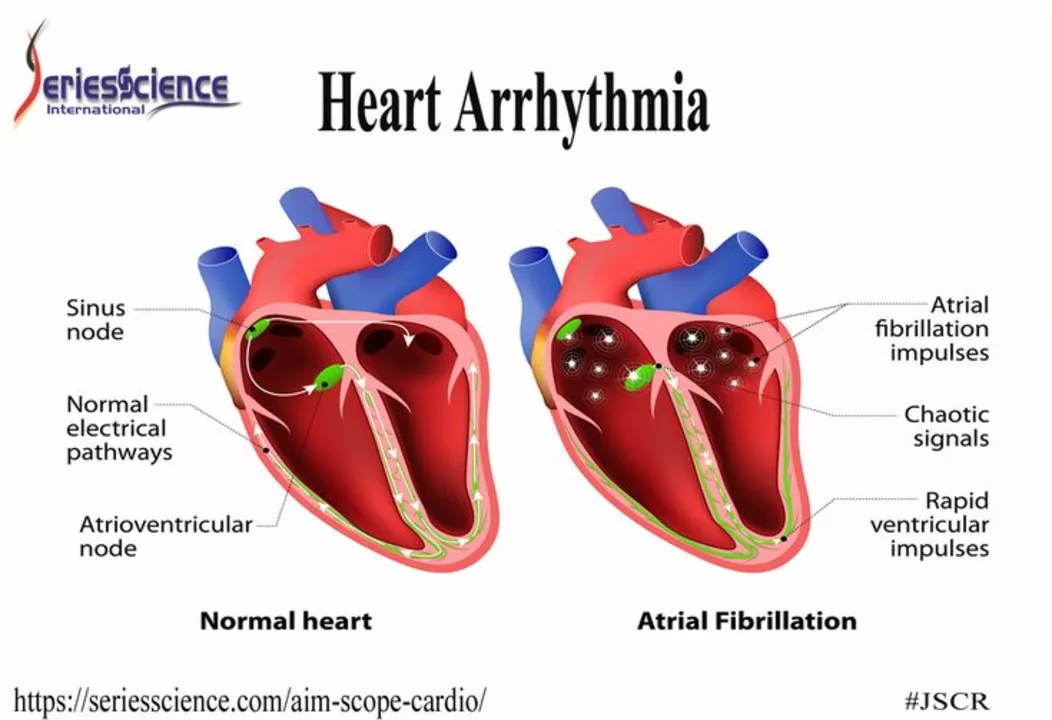Amiodarone in Atrial Fibrillation: A Review of Recent Studies and Developments
 Apr, 28 2023
Apr, 28 2023
Introduction to Amiodarone and Its Role in Atrial Fibrillation
In recent years, there has been a growing interest in the use of amiodarone for the treatment of atrial fibrillation. This article aims to provide a comprehensive overview of the latest studies and developments surrounding amiodarone and how it is being used to manage this common cardiac arrhythmia. As a blogger who has been closely following the advancements in this field, I am excited to share my insights with you on this important topic.
Understanding the Mechanism of Action of Amiodarone
Amiodarone is a unique antiarrhythmic drug with multiple mechanisms of action. It works by blocking potassium, sodium, and calcium channels, as well as inhibiting the beta-adrenergic receptors in the heart. This helps in slowing down the heart rate and stabilizing the cardiac rhythm. Additionally, amiodarone has vasodilatory effects and has been shown to improve left ventricular function in patients with heart failure. In this section, we will delve deeper into the science behind how amiodarone works to treat atrial fibrillation.
Amiodarone in Acute Atrial Fibrillation Management
Acute atrial fibrillation can be a challenging condition to manage, especially in patients with rapid ventricular rates and hemodynamic instability. Amiodarone has been shown to be a highly effective option for rate control and rhythm control strategies in these situations. Recent studies have demonstrated that intravenous amiodarone is well-tolerated and can quickly convert atrial fibrillation to sinus rhythm, making it a valuable tool in the emergency department setting. In this section, we will discuss the evidence supporting the use of amiodarone in acute atrial fibrillation episodes.
Amiodarone for Long-term Atrial Fibrillation Management
For patients with recurrent atrial fibrillation episodes, long-term management strategies are crucial to maintaining a stable cardiac rhythm and improving quality of life. Amiodarone has been found to be effective in preventing atrial fibrillation recurrence, reducing hospitalizations, and improving overall outcomes. However, it is important to balance these benefits with the potential side effects and drug interactions that may come with long-term use. This section will explore the pros and cons of amiodarone as a long-term treatment option for atrial fibrillation.
Amiodarone vs. Other Antiarrhythmic Drugs
When it comes to managing atrial fibrillation, there are several antiarrhythmic drugs available, and choosing the most appropriate one can be a complex decision. Amiodarone is often compared to other options such as sotalol, flecainide, and propafenone in terms of efficacy and safety. In this section, we will review the latest studies comparing amiodarone to its counterparts and discuss which patients may benefit the most from each treatment option.
Amiodarone in Patients with Heart Failure and Atrial Fibrillation
Heart failure and atrial fibrillation often coexist and can exacerbate each other's symptoms. Amiodarone's unique pharmacological properties make it an attractive option for patients with both conditions. This section will focus on the evidence supporting the use of amiodarone in this specific patient population and discuss the potential benefits and risks associated with its use.
Amiodarone and Stroke Prevention in Atrial Fibrillation
One of the major concerns in atrial fibrillation management is the risk of stroke. While anticoagulation therapy plays a crucial role in reducing this risk, appropriate rhythm control strategies may further contribute to stroke prevention. In this section, we will examine the relationship between amiodarone use and stroke risk in patients with atrial fibrillation and explore the potential implications for clinical practice.
Amiodarone and Thyroid Dysfunction
One of the most notable side effects of amiodarone is its potential to cause thyroid dysfunction. This is due to its high iodine content and the drug's ability to interfere with thyroid hormone synthesis and metabolism. In this section, we will discuss the incidence of thyroid dysfunction in patients taking amiodarone, strategies for monitoring and managing this side effect, and the implications for patients with pre-existing thyroid disease.
Amiodarone and Pulmonary Toxicity
Amiodarone-induced pulmonary toxicity is a rare but potentially fatal side effect of the drug. It is essential for healthcare providers to be aware of this complication and to closely monitor patients using amiodarone. In this section, we will review the risk factors for developing amiodarone-induced pulmonary toxicity and discuss strategies for its prevention, detection, and management.
Conclusion: The Future of Amiodarone in Atrial Fibrillation Management
In conclusion, amiodarone is a versatile and effective drug for managing atrial fibrillation in various clinical scenarios. While it has its share of potential side effects, the benefits of using amiodarone often outweigh the risks, especially in specific patient populations. As new research emerges and our understanding of atrial fibrillation pathophysiology evolves, it will be interesting to see how amiodarone's role in the management of this common arrhythmia continues to develop. As a blogger passionate about this topic, I am eager to keep you updated on the latest advancements in amiodarone and atrial fibrillation research.


Kyle Tampier
April 28, 2023 AT 13:26Tom Caruana
April 30, 2023 AT 10:28Muzzafar Magray
May 2, 2023 AT 00:12Renee Williamson
May 2, 2023 AT 16:13Manish Mehta
May 3, 2023 AT 13:42Okechukwu Uchechukwu
May 5, 2023 AT 13:08Sarah Cline
May 5, 2023 AT 20:34Sierra Thompson
May 5, 2023 AT 21:45Khaled El-Sawaf
May 5, 2023 AT 21:58Nawal Albakri
May 7, 2023 AT 05:34Megan Oftedal
May 8, 2023 AT 21:56Musa Aminu
May 9, 2023 AT 22:31robert maisha
May 10, 2023 AT 02:04Alexander Ståhlberg
May 10, 2023 AT 05:40Robert Andersen
May 10, 2023 AT 13:17Eric Donald
May 10, 2023 AT 20:34Brenda Flores
May 11, 2023 AT 16:57Jackie R
May 12, 2023 AT 10:35Josh Arce
May 13, 2023 AT 21:15